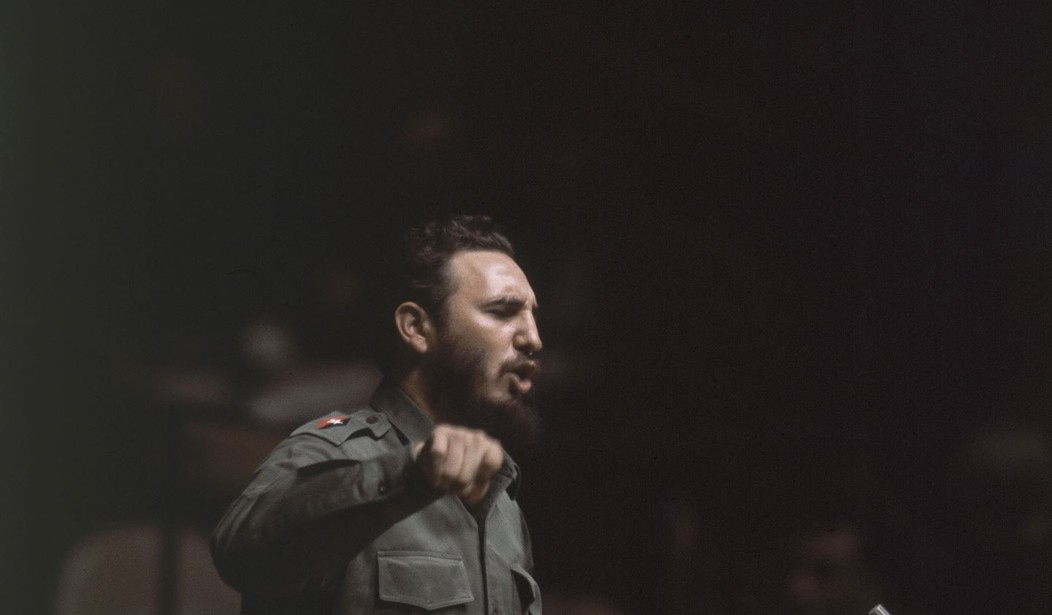January 7, 1959, marks a milestone in U.S. diplomatic history. Never before had the U.S. State Department extended diplomatic recognition (i.e. benediction) to a Latin American government as quickly as they bestowed this benediction on KGB satraps Fidel Castro and Che Guevara’s that day.
At the time, Castro himself had yet to even enter Havana.
Nothing so frantically fast had been bestowed upon “U.S.-backed” Fulgencio Batista (obligatory prefix, used in every MSM and “scholarly” mention of him) seven years earlier. “U.S.-backed” Batista had in fact been punished by a U.S. arms embargo and heavy diplomatic pressure to resign for a year. Then Batista was denied exile in the U.S. and not even allowed to set foot in the country that “backed” him.
On a visit to Cuba in 2001 for a “scholarly summit” with Fidel and Raul Castro, Robert Reynolds — who served as the CIA’s Caribbean desk specialist on the Cuban revolution in 1960 — clarified the U.S. diplomatic stance of the time: “Me and my staff were all Fidelistas,” he boasted.
Reynolds’ colleague Robert Weicha, who served as CIA chief in Santiago, Cuba, in the late 1950s, concurred.
Everyone in the CIA and everyone at State were pro-Castro, except Ambassador Earl T. Smith.
Weicha was a hands-on type of Fidelismo. In the fall of ’57, Weicha and U.S. Consul Park Wollam smuggled into Cuba the state-of-the-art transmitters that became Castro and Che’s Radio Rebelde. From these mics, the Castroites broadcast their “guerrilla victories” island-wide, along with their plans to uplift Cuba into a Caribbean Shangri-La inspired by the principles of Adam Smith, John Stuart Mill, Thomas Jefferson, and St. Francis of Assisi. These proclamations were then reaching most of the English-speaking world through the good work of the New York Times and CBS (Herbert Matthews and Don Hewitt, respectively.)
Recommended
“War against the United States is my true destiny!” Fidel Castro had confided in a letter to a friend in June 1958. “When this war’s over I’ll start that much bigger war.” Alas, this message was not broadcast over the U.S.-issue “Radio Rebelde,” and apparently slipped past our crackerjack CIA.
Within days of recognizing Castro’s regime, the U.S. State Department sacked its Republican ambassador to Cuba, Earl.T. Smith– that insufferable pest mentioned by Weicha. Smith’s unforgivable gaffe was repeatedly warning that supporting the Castro rebels (as we’ve seen, both morally and materially) while pulling the rug out from under Batista was not the shrewdest method of advancing U.S. interests, to say nothing of the interests of the Cuban people.
Months earlier, an alarmed Smith contacted Jim Noel, CIA station chief in Havana, with reports from his Cuban contacts about communist string-pullers existing within Castro’s movement, and about Che Guevara’s well-known communist ties and sympathies. (When arrested in Mexico City in 1956, Guevara was carrying in his pocket the business card of the local KGB agent, who also served as Raul Castro’s KGB handler since 1953.) But Noel could hardly mask his annoyance at the naysaying Republican alarmist:
“Don’t worry, Ambassador,” snapped the typically liberal CIA officer. “We’ve infiltrated Castro’s group in the Sierra. The Castros and Che Guevara have no affiliations with any Communists whatsoever.”
Smith’s replacement — Phil Bonsal, a liberal career diplomat — fully backed and quickly adopted the official “carrot and even bigger carrot” policy towards Castro. The policy soon showered the new Cuban regime with $200 million in subsidies from U.S. taxpayers.
Castro was quick to respond:
“The U.S. is a vulture preying on humanity!” he raved just a week after Smith’s sacking. “Let the Marines invade! Then we’ll pile up 200,000 dead gringos!”
As mentioned, the only “U.S. invasion” then envisaged was one of smiling, groveling Yankee diplomats and Yankee taxpayer subsidies.
Alert Cubans started plotting against Castro almost from day one, but — alert to who helped him into power — they kept well clear of U.S. officials, turning instead to Rafael Trujillo in the Dominican Republic for some logistical assistance. Nonetheless, in August 1959, Phil Bonsal got wind of this plot and promptly alerted Castro to a conspiracy against his regime manned solely by Cubans. Thanks in part to Bonsal’s solicitude for the regime insulting his nation as “a vulture preying on humanity” and poised to steal $2 billion from U.S. stockholders, the anti-Castro plot was foiled.
Hundreds of the Cuban plotters were imprisoned. Some were executed. And the regime that three years later came close to vaporizing many of America’s largest cities with nuclear missiles (including Bonsal’s home) survived.
Then, as now, the word gringo was very rarely used by Cubans. So in his “vulture” tirade, Castro was already mugging to the Latin American gallery. Castro’s very first trip abroad as head of state was to Caracas, where on January 25, 1959, he implored Venezuelan President Romulo Betancourt to “join” his “master plan against the gringos.” The newly elected Venezuelan president soon learned that his “joining” would consist of massive loans, financial aid, and shipments of free oil to Castro from Venezuela. So Betancourt decided to “think it over.”
It took Hugo Chavez for Venezuela to finally “join” Castro’s master plan. In mid-2005, 160,000 barrels of essentially free oil were flowing from Venezuela to Cuba daily, a flow that continues almost unabated despite Venezuela’s floundering economy. Chavez and his successor Maduro’s honorarium comes in the form of the thousands of Cuban specialists who essentially run Venezuela’s security and intelligence sectors.
Not a bad bargain, actually. Trained and mentored for decades by the KGB and East German STASI, Castro’s secret police is considered among the most “proficient” on Earth, as befits a regime that jailed political prisoners at a higher rate than Stalin’s and executed (murdered, actually; the former term implies some form of judicial process) more people in its first three years in power than Hitler did in his first six.
Within weeks of his “dead gringos!” tirade and his Venezuelan visit, Castro’s regime had stolen the Cuban Telephone Company (an ITT subsidiary), commencing a mass larceny of U.S. property at Soviet gunpoint that would reach almost $2 billion in little over a year — and included the torture and firing squad murder of several U.S. citizens who resisted.
The Castro regime has never settled a penny of this mass burglary with its U.S. victims. Search for any mention of the above in any Fake News Media article on the so-called U.S. embargo of Cuba (in fact, we’ve been among Cuba’s main food suppliers for well over a decade now) and you will draw a complete blank.
“But that’s hoary Cold War stuff, Humberto,” some will counter. Perhaps, but many of the same people run Cuba today as ran it in 1959, and the Biden-Harris regime is poised and heck-bent on “engaging” them yet again.

























Join the conversation as a VIP Member